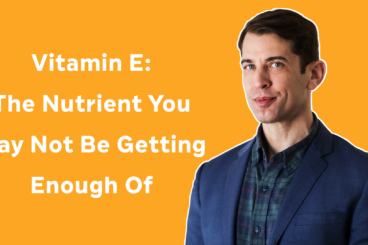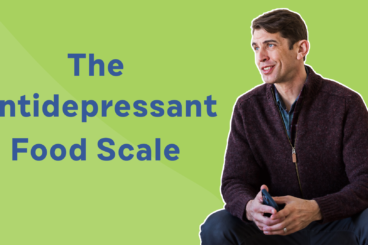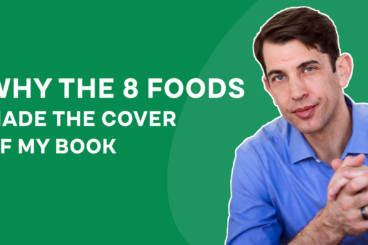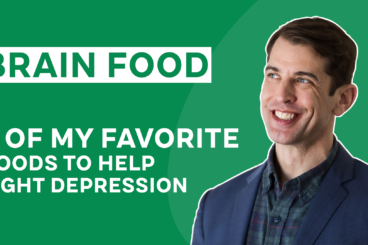Let’s talk about vegetarian and vegan diets and mental health. This is something people debate and one of the things I’ve noticed as a nutritional psychiatrist is some of the debates that I’ve seen people having about their nutrition don’t revolve around the right thing. Your nutrition decisions should revolve around your brain health and your mental health in particular. So when we look at vegetarian and vegan diets, there are a few of the important antidepressant nutrients, a few of the really key nutrients for mental health that are just lower or non-existent in vegan and vegetarian diets. A lot of times this becomes a point of contention. I’m a clinician, so if you want to be a vegan or a vegetarian, I’m going to be interested in that. I think there are a lot of strong opinions that people have and for those of us who are in the clinical world, our job is to be your companion and to help you think about if you are a vegan or vegetarian, how you can do that in a way that really makes sure you’re protecting your brain.
So let’s go over some of the quick concerns and what we’ve seen in the data and then talk about some of the easy solutions. There’s a reason that plant-based diets have become popular. Plant-based diets tend to have more fiber and more phytonutrients which are really interesting molecules that you find in plants. Plant-based diets have a lower caloric density generally, so you’re eating in some ways more efficiently. Also plants are mostly water, so you stay hydrated when you’re on a more plant-based diet.
The concern revolves around a few nutrients. First, vegetarians and vegans usually get a lot of messaging around B12. Vitamin B12 is the largest B vitamin that we eat. We actually have a whole specialized absorption system. Parietal cells in our stomach make intrinsic factor specifically to absorb vitamin B12. You can find B12 in meat, dairy, and seafood such as bivalves. Clams are actually the top source. When individuals are cutting out those food categories, they’re going to miss vitamin B12. While you store several years of B12 in your liver, you can go for a while without eating it, it’s something that you do need to replenish when individuals get B12 deficient. Even with low levels of B12 you can get neuropsychiatric symptoms like depression and brain fog and then eventually if people are B12 deficient you end up with really significant depression and then dementia which is all concerning.
Some studies have shown that even though there is a lot of messaging about this, a number of individuals following a vegan diet still struggle with B12 deficiency. There was a study in the UK, the Epic Oxford Dataset, and they looked at male vegans and found 52% of them were completely B12 deficient. What do you do? Well, you can supplement and if you’re a vegetarian who is okay with consuming seafood and bivalves in particular, this is a good option. I have found some vegans and vegetarians are fine eating bivalves. They’re lower in the animal kingdom in a certain way. They’re a great source of the nutrients that you miss eating a vegan or a vegetarian diet. They’re filled with minerals such as B12, zinc, and iron. They contain other minerals like iodine and selenium that you find in plants, but they’re a little harder to absorb in plants and bivalves have a really big megadose of them.
Another nutrient that’s lower in vegan and vegetarian diets are the long-chain omega-3 fats. You get short chained omega-3 fats, which is ALA alpha-linolenic acid and that fat is converted in your body to longer chained omega-3 fats. The reason we care about omega-3 fats from a brain health perspective is there’s a lot of data that omega-3s are involved in mood. When you look at what happens as people move towards a more traditional diet, they generally are eating fewer omega-6 fats that come from the seed oils we find in processed foods and more omega-3 fats that you’re going to find in plants, but mostly in seafood. That’s where the really highly concentrated sources of DHA and EPA are. If you’re a vegan or a vegetarian and you don’t want to eat any seafood at all, you can supplement these with an algae oil. You can also increase the amount of ALA that you’re eating. People often do that with flaxseed, for example, which has a lot of ALA in it.
For vegans and vegetarians you can eat in a brain healthy way for mental health, but you want to be aware of some of the nutritional challenges that this dietary pattern can present and then respond quickly. You want to eat a diet that has all the minerals, making sure to get all of the fats and various things like the B vitamins for your mental health. If you’re cutting out a food category, such as all meat or seafood and not have sources of things like highly absorbable forms of iron or zinc or long chain omega-3 fats, then you want to supplement those, especially if you’re having mood and mental health symptoms.
This is classic nutritional psychiatry. How do we think about you, your preferences, your values, your culture and then make sure within those confines you are getting all the nutrients that you need for your mental health and your brain health. Sometimes, for example, if you’re a vegan, you’ve got to be getting B12 from some other source because you’re not getting it from food and if you’re struggling with mood and anxiety, I encourage you to think about some of these other nutrients that are lower in a vegan or vegetarian diet. I hope this helps you think through why plants are so popular and all the benefits they have, but also some of the yellow flags to pay attention to if you’re eating more plant forward and some of the nutrients you want to seek out.



